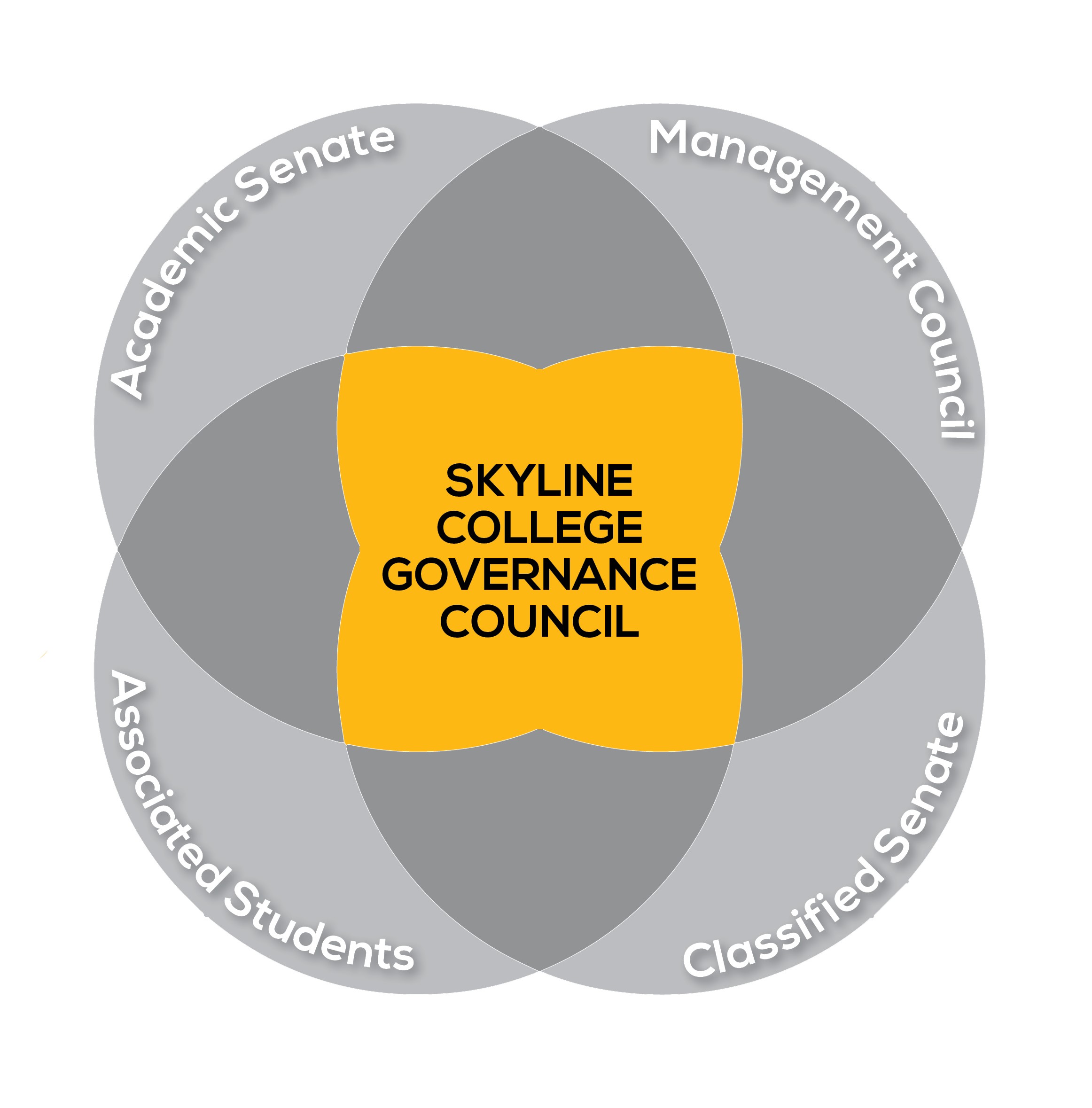Participatory Governance

The mission of Skyline College is to empower and transform a global community of learners. Consistent with its Mission-Vision-Values, participatory governance at Skyline College is a key means through which the campus community collaborates to inform and shape institutional practices, and procedures to ensure a more inclusive and equitable environment for employees and students.
All members of the Skyline College campus community are encouraged to play an active role in participatory governance and to express their opinions to inform decision-making at the San Mateo County Community College District and at Skyline College. Skyline College's participatory governance and shared decision-making processes are structured to align with California Education Code sections §70901 and §53203, §51023.5 and §51023.7, as well as San Mateo County Community College District Board of Trustees Board Policy 2510: Participation in Local Decision-Making and Administrative Procedure 2.08.1: District Participatory Governance Process .
As outlined in the charter and bylaws of the College Governance Council, in order for participatory governance to work, there must exist a covenant of mutual trust, honesty, open agendas, equity, and respect for differing views. Essential to maintaining this covenant are open communications and feedback from all constituencies. All parties must commit to and take responsibility for fostering and maintaining an environment in which participatory governance can occur, as well as being well-informed regarding issues
Types of Participatory Governance Bodies
Skyline College’s participatory governance structure consists of the following types of governance bodies:
- Senate/Council: An elected, appointed, or ex-officio governance body that recommends, advocates for, and addresses matters of interest to their members in alignment with the College Mission, Vision and Values.
- Standing Committee: A sub-committee of a Senate or Council created to focus on a specific matter.
- Constituent Committee: A governance body composed of representatives from the four constituent groups: Associated Students of Skyline College, Academic Senate, Classified Senate, and Management Council. Constituent Committees are delegated by CGC to consider, investigate, recommend, or report on college-wide matters.
- Task Group: A short-term group created and charged by a Constituent Committee or Council/Senate,
that carries out a specific task.
- Task Groups are not listed in the Participatory Governance Guide due to their fluid structure and purpose to address specific, short-term issues. Task groups are formed and dissolved, as needed, with governance body action item approval
Participatory Governance Model
The following bodies make up the six senates and councils at Skyline College, with the first four serving as the representatives for each of their respective constituent groups:
- Associated Students of Skyline College (ASSC)
- Academic Senate (AS)
- Classified Senate (CS)
- Management Council
- Executive Council (“President’s Cabinet”)
- College Governance Council (CGC)
Together, the leaders of the six bodies outlined above constitute the leadership of
the College. Each of these councils and senates is independent of the others and operates
according to its own bylaws and meeting norms. Academic Senate, Associated Students
and Classified Senate members are elected by their respective constituent groups.
Management Council and Executive Council membership is assigned based on employee
roles.

Skyline College’s College Governance Council (CGC) serves as the umbrella participatory governance committee for the College and is the primary participatory governance body informing decision-making for the College. The CGC consists of the two leaders representing each of the four constituent groups: Academic Senate, Associated Students of Skyline College, Classified Senate and Management Council; the President and the Executive Council members are Ex-Officio, non-voting members of the CGC. The President of the College only votes as a tiebreaker, if needed. CGC makes recommendations directly to the President of the College who is responsible for making all college-level decisions.
CGC is empowered to create and charge constituent committees to consider, investigate, recommend, or report on college-wide matters. Each Constituent Committee reports up to the CGC, which is responsible for reviewing the progress and accomplishments of the constituent committees.
The College Governance Council has an important role to play in institutional planning. Skyline College develops and maintains several key institutional plans that entail consultation, review and/or feedback as part of the participatory governance process. Plan development is typically carried out by the corresponding constituent committee, which then recommends the plan up to CGC for recommendation to the College President and/or Board of Trustees for approval (e.g., the Skyline College Education Master Plan, Skyline College Student Equity Plan, etc.).
College-level plans are developed in collaboration with and in alignment with District-level plans (e.g., District Strategic Plan, Facilities Master Plan, etc.), when appropriate. The relevant participatory governance body or bodies must be consulted with and/or engaged in the development, review, and completion of college plans that directly relate to the participatory governance body’s charge (e.g., the Skyline College Education Master Plan and Skyline College Student Equity Plan originate in SPARC and SEEED, respectively). Furthermore, each participatory governance body is expected to regularly engage with and align their work with the implementation of institutional plans that are most relevant to their charge.
The Skyline College Governance Council will undertake a review of the College’s governance and decision-making structures at least once every accreditation cycle, as part of the College’s institutional self-evaluation process.